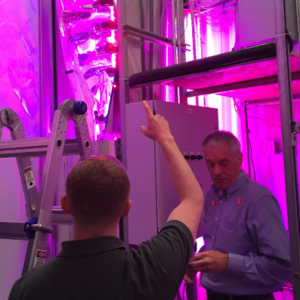PHYCO2 algae pilot program with MSU reaches new milestones

Photo: PHYCO2
October 16, 2018
BY PHYCO2
PHYCO2 LLC reached a new milestone in its three-year pilot program with Michigan State University, announcing the operation of its new, scalable algae production technology reactor, which will reduce the level of carbon emissions produced by electric power generation boilers.
In 2015, PHYCO2 engaged with MSU to test its patented algae photobioreactor (APB) design. The tests demonstrated that the reactor was stable with the continuous operation of algae production for more than five months without extensive biofouling. In 2017, MSU received a three-year DOE grant to develop a new approach to carbon capture technology development. PHYCO2 was chosen as MSU’s partner to absorb a portion of the CO2 emissions from the combustion boilers at the T.B. Simon power plant and grown algae. The algae will then be converted via a chemical cascade process into several chemicals, including an amine that will be used for the bulk of the CO2 capture process at the power plant. The other chemical products have commercial applications. To date, the PHYCO2 algae reactor has operated continuously for more than seven months and is still running.
A new 1,000-liter reactor, based on a new patent-pending APB design, was also built and put in service. The new design builds upon the earlier research with lower anticipated operating costs, scalable design and higher productivity rates. The conversion process transforms CO2 to algae, which then can be used for a multitude of products, including nutrition for humans and animals, cosmetics and pharmaceuticals.
Dr. Wei Liao, MSU associate professor and director of the Anaerobic Digestion Research and Education Center, Department of Biosystems & Agricultural Engineering and advisor to PHYCO2’s testing program, said, “This program with the Department of Energy and PHYCO2 aligns our long-term research with algae systems, carbon capture and sequestration, and brings in a new element of chemical synthesis pathways with organic feedstocks.”
William Clary, PHYCO2 president and CEO stated, “The studies conducted at MSU with PHYCO2’s algae photobioreactor represents the growth and development of future food sources and environment-saving technology that truly is market sustainable. The technology development allows PHYCO2 to continue to be at the forefront of cutting-edge research and development. The collaboration is a direct response to the current global demand of cost-competitive algae sources and CO2 emission reductions. New protein sources, health drinks and infant formulas are just a few of the many types of products that will be impacted by the production of this pure microalgae. Our goal guarantees the continued growth of one of nature’s most essential organisms—high-value, pure, microalgae. Together, with MSU, our team is transforming innovation that will help improve the everyday lives of people around the world.”
Advertisement
Advertisement
Related Stories
SAF Magazine and the Commercial Aviation Alternative Fuels Initiative announced the preliminary agenda for the North American SAF Conference and Expo, being held Sept. 22-24 at the Minneapolis Convention Center in Minneapolis, Minnesota.
Scientists at ORNL have developed a first-ever method of detecting ribonucleic acid, or RNA, inside plant cells using a technique that results in a visible fluorescent signal. The technology could help develop hardier bioenergy and food crops.
The 2025 International Fuel Ethanol Workshop & Expo, held in Omaha, Nebraska, concluded with record-breaking participation and industry engagement, reinforcing its role as the largest and most influential gathering in the global ethanol sector.
TotalEnergies and Quatra, the European market leader in the collection and recycling of used cooking oil, have signed a 15-year agreement beginning in 2026, for the supply of 60,000 tons a year of European used cooking oil.
The USDA maintained its forecast for 2025-’26 soybean oil use in biofuel production in its latest World Agricultural Supply and Demand Estimates report, released June 12. The estimate for 2024-’25 soybean use in biofuel production was revised down.
Upcoming Events










